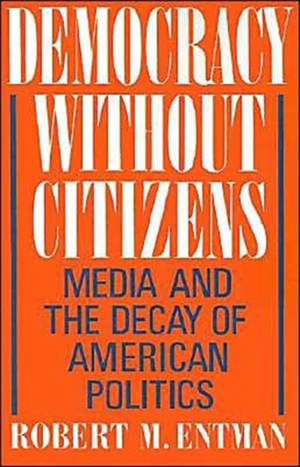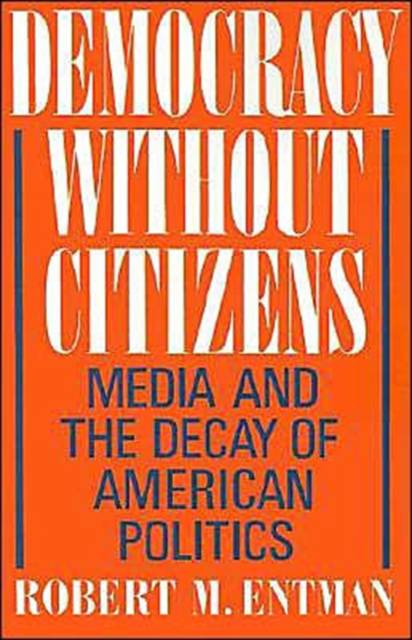
- Afhalen na 1 uur in een winkel met voorraad
- Gratis thuislevering in België vanaf € 30
- Ruim aanbod met 7 miljoen producten
- Afhalen na 1 uur in een winkel met voorraad
- Gratis thuislevering in België vanaf € 30
- Ruim aanbod met 7 miljoen producten
Zoeken
Democracy Without Citizens
Media and the Decay of American Politics
Robert M Entman
Paperback | Engels
€ 58,45
+ 116 punten
Omschrijving
"The free press cannot be free," Robert Entman asserts. "Inevitably, it is dependent." In this penetrating critique of American journalism and the political process, Entman identifies a "vicious circle of interdependence" as the key dilemma facing reporters and editors. To become sophisticated citizens, he argues, Americans need high-quality, independent political journalism; yet, to stay in business while producing such journalism, news organizations would need an audience of sophisticated citizens. As Entman shows, there is no easy way out of this dilemma, which has encouraged the decay of democratic citizenship as well as the media's continuing failure to live up to their own highest ideals. Addressing widespread despair over the degeneration of presidential campaigns, Entman argues that the media system virtually compels politicians to practice demagoguery.
Entman confronts a provocative array of issues: how the media's reliance on elite groups and individuals for information inevitably slants the news, despite adherence to objectivity standards; why the media hold government accountable for its worst errors--such as scandals and foreign misadventures--only after it's too late to prevent them; how the interdependence of the media and their audience molds public opinion in ways neither group alone can control; why greater media competition does not necessarily mean better journalism; why the abolition of the FCC's Fairness Doctrine could make things worse. Entman sheds fascinating light on important news events of the past decade. He compares, for example, coverage of the failed hostage rescue in 1980, which subjected President Carter to a barrage of criticism, with coverage of the 1983 bombing that killed 241 Marines in Lebanon, an incident in which President Reagan largely escaped blame. He shows how various factors unrelated to the reality of the events themselves--the apparent popularity of Reagan and unpopularity of Carter, differences in the way the Presidents publicly framed the incidents, the potent symbols skillfully manipulated by Reagan's but not by Carter's news managers--produced two very different kinds of reportage.
Entman concludes with some thoughtful suggestions for improvement. Chiefly, he proposes the creation of subsidized, party-based news outlets as a way of promoting new modes of news gathering and analysis, of spurring the established media to more innovative coverage, and of increasing political awareness and participation. Such suggestions, along with the author's probing media criticisms, make this book essential reading for anyone concerned about the state of democracy in America.
Entman confronts a provocative array of issues: how the media's reliance on elite groups and individuals for information inevitably slants the news, despite adherence to objectivity standards; why the media hold government accountable for its worst errors--such as scandals and foreign misadventures--only after it's too late to prevent them; how the interdependence of the media and their audience molds public opinion in ways neither group alone can control; why greater media competition does not necessarily mean better journalism; why the abolition of the FCC's Fairness Doctrine could make things worse. Entman sheds fascinating light on important news events of the past decade. He compares, for example, coverage of the failed hostage rescue in 1980, which subjected President Carter to a barrage of criticism, with coverage of the 1983 bombing that killed 241 Marines in Lebanon, an incident in which President Reagan largely escaped blame. He shows how various factors unrelated to the reality of the events themselves--the apparent popularity of Reagan and unpopularity of Carter, differences in the way the Presidents publicly framed the incidents, the potent symbols skillfully manipulated by Reagan's but not by Carter's news managers--produced two very different kinds of reportage.
Entman concludes with some thoughtful suggestions for improvement. Chiefly, he proposes the creation of subsidized, party-based news outlets as a way of promoting new modes of news gathering and analysis, of spurring the established media to more innovative coverage, and of increasing political awareness and participation. Such suggestions, along with the author's probing media criticisms, make this book essential reading for anyone concerned about the state of democracy in America.
Specificaties
Betrokkenen
- Auteur(s):
- Uitgeverij:
Inhoud
- Aantal bladzijden:
- 256
- Taal:
- Engels
Eigenschappen
- Productcode (EAN):
- 9780195065763
- Verschijningsdatum:
- 27/09/1990
- Uitvoering:
- Paperback
- Formaat:
- Trade paperback (VS)
- Afmetingen:
- 139 mm x 219 mm
- Gewicht:
- 335 g

Alleen bij Standaard Boekhandel
+ 116 punten op je klantenkaart van Standaard Boekhandel
Beoordelingen
We publiceren alleen reviews die voldoen aan de voorwaarden voor reviews. Bekijk onze voorwaarden voor reviews.











